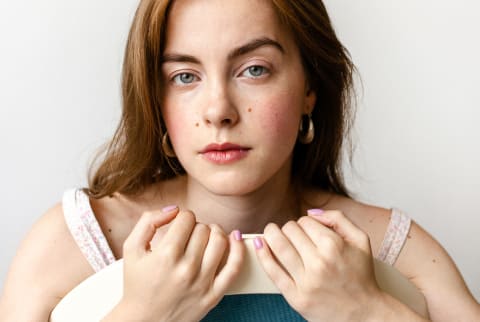Advertisement
How To Make Your Base Makeup Look Like A Second Skin, From A Pro


A "natural" makeup look might appear effortless, but there's typically a good deal of effort put into it—especially in the world of film. In this TikTok video, makeup artist Bronte-Marie Wesson recreates a Pride and Prejudice–esque look, where her base looks exactly like a second skin.
No, the secret is not one specific foundation or concealer. Instead, it's about how you use those base products. Here's the 101.
Tip No. 1: Don't use just one base product
"You'll need a tinted moisturizer, a foundation, and a concealer," Wesson says. While this may seem like more makeup than you'd expect for a second-skin look, you won't actually be using too much product. And when you blend it correctly (more tips below!), you won't look like you're wearing anything at all.
She chose to use the Ilia Super Serum Skin Tint SPF 40, Kosas Revealer Foundation, and the cult favorite Kosas Revealer Concealer—all clean and lightweight products that tend to the health of your skin and create a smooth, natural finish.
Layer the skin tint first, using more of it than you do the foundation, and only use a bit of concealer under your eyes and to cover any blemishes.
Tip No. 2: Blend with your fingers and finish with a sponge
"Your hands are your best tool for foundation if you want it to look seamless," Wesson explains. Once you've pressed the product into your skin, take a medium-damp beauty sponge and blend in whatever looks unfinished.
And if you want more coverage, work from the inside out. Essentially, use more foundation on the center of your face and minimal coverage as you work your way out to the hairline.
This way, there's no chance of spotting a dramatic line where your foundation stops and bare skin begins.
To top it off: A natural flush
While placing blush on the high points of your cheekbones may provide a nice lift, it's not going to give the appearance of a natural flush. "Instead of lifting it on the cheek, you're working right on the apple," Wesson says.
Try to find a blush that resembles your natural flush and complements your undertones—you can dive into that topic more here.
The takeaway
Let's review: To nail a natural flush, first start with a three-part base. Next, blend with your fingertips and finish with a beauty sponge.
To top it all off, place your blush on the apples of your cheeks and don't sweep it up your cheekbones. And there you have it! A "low-key" makeup look that looks great on camera. If you want to dress it up, please feel free to add a shimmery eye shadow or a dramatic mascara for extra oomph. You can't go wrong with a little glam.